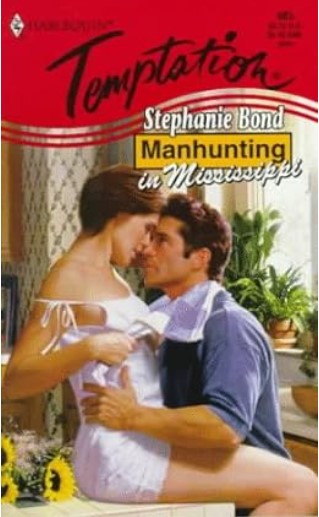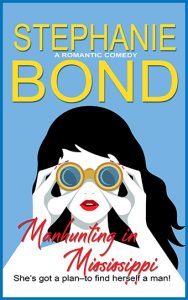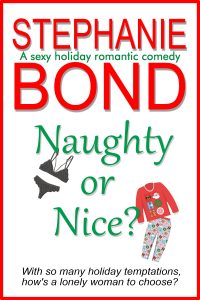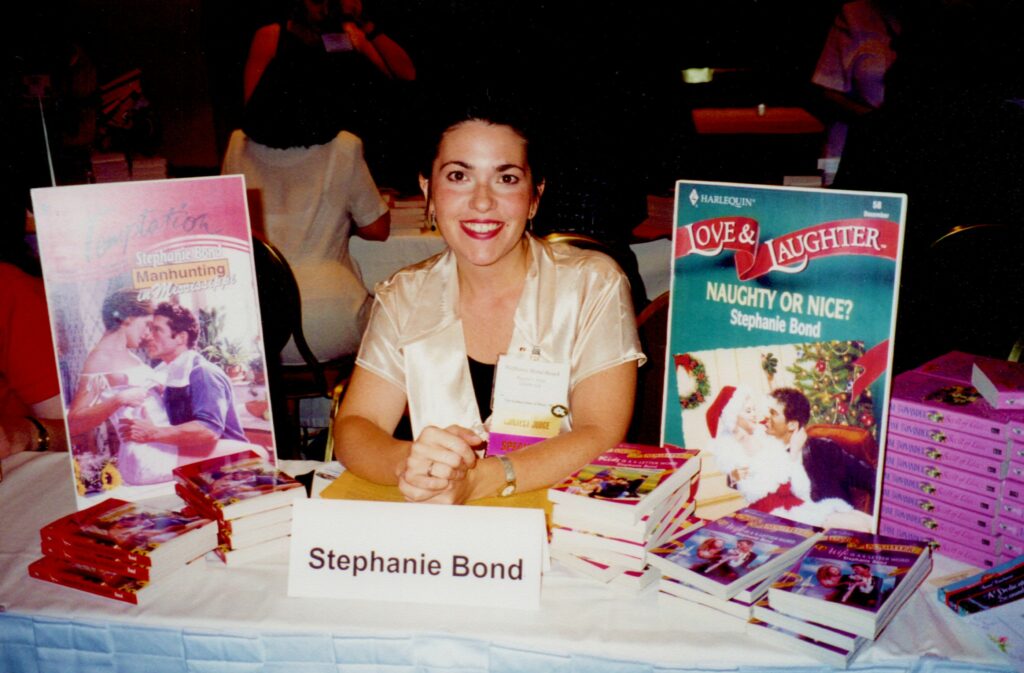←Return to Chapter 7: I Got This (I Think):
It was mid-1998 and I was starting to get into a good groove of selling romance manuscripts to Harlequin Love & Laughter and to Bantam Loveswept. My Harlequin editor Brenda Chin had also asked me to pitch a story for another line she edited, the Harlequin Temptation line. That was an exciting promotion for me because the line was more successful. I was writing and delivering manuscripts while doing staggered revisions and line edits and copyedits and cover art forms and a dozen other sets of tasks required for the lifecycle of a romance novel. I absolutely loved it, but between my demanding new career and my personal commitments, it felt as if I never had a free moment. Writing is like that—you can feel as if you should always be working on a story.
One thing that kept me sane was meeting every week with my critique group, writers I'd met through Georgia Romance Writers. We would meet on a weekday evening at a restaurant that was central to all of us. We spent the first few minutes catching up and sharing news. Then we ordered our meals, and while we waited for our food, we would focus on one person's pages that we'd taken home the week before to read and write comments directly on the pages. We took turns going through the pages and giving our critiques, asking questions, and doling out advice to fix problems. While we ate and afterward, we'd finish everyone's critique. Sometimes members would bring a one-page idea, sometimes members would bring 20 pages. Sometimes we agreed on how to improve a story, sometimes we didn't, and it was always up to the writer being critiqued as to whether to take members' advice. We were all at different stages of our careers—half of the group members were published with active contracts, and the rest of the members were actively writing and submitting ideas to various publishers. We were all invested in each other's success and cheered each other on. We celebrated good news and commiserated over bad news.
All of us were writing romance, but in different subgenres (with different audiences): romantic comedy, romantic suspense, paranormal romance, sweet romance, multi-cultural and African American romance. You might think that would make it harder to critique each other, but it allowed us to read each other's pages as a reader, and not someone who also wrote that type of romance. And critiquing someone else's pages is the surest way to improve your own writing—it's much easier to see mistakes someone else is making, then realize you're making the same mistakes! In my experience, the success of a writing critique group has less to do with all the members writing in similar genres, and more to do with everyone having the same level of commitment and ambition.
Once a month I attended the Georgia Romance Writers meeting. Now that I was published, I was eligible to belong to the Published Author Network, which was a subgroup that focused on the particular challenges of authors that were under contract, such as dealing with agents and paperwork, the care and feeding of editors :- ), plus marketing and advertising. The conventional saying was that unpublished authors believed their problems would be solved when they sold their first book, when in reality, a newly published author simply traded one set of problems for another. Granted, though, it was a set of problems most of us preferred!
Speaking of problems… a few months prior my editor at Bantam Loveswept had left the industry and I was assigned a new editor, Stephanie Kip, whom I loved working for as much as the first editor. Stephanie edited my third Loveswept, Three Wishes, and I was looking forward to working on many more projects with her, including the fourth project I'd just sold her about a young woman in a coma in a hospital bed, and the young man who'd caused the accident who'd put her there. But sadly, Stephanie called to let me know that after 16 years the Bantam Loveswept line, which had spawned the careers of many mega-authors, would be ending the following year. (Click on this link to read more about the history of the Bantam Loveswept line and some of the famous authors who wrote for it, plus details about the later resurgence of the line in ebook-only format.) When I asked what would happen with my coma story, Stephanie explained the editorial board had decided for all books that had been contracted but not yet delivered, the contracts would be cancelled, and the author could keep the advance already paid (a generous gesture, I should point out). She and I were both sad our time together at Loveswept was over, but I was hopeful I might work with her again someday. Careers, after all, are long.
As promised, I received a letter from Bantam canceling my contract for the coma book and reverting all rights back to me. My agent Ruth Kagle then suggested that we request rights reversion for the three books of mine that were published under the name Stephanie Bancroft. I remember at the time asking her what on earth would I do with them if I got them back? She said it didn't matter if I had plans for them or not, that it would be better if the rights were in my hands rather than someone else's. (Years later when the self-publishing industry exploded, I would realize just what a visionary Ruth was.)
So we requested the rights back. I should say here that like most publishers, Bantam recognized the value in sitting on early books and re-releasing them when authors made a name for themselves, but since I'd written the 3 books under a name different than the name I wrote under for Harlequin, even if I went on to be a mega-star at Harlequin, Bantam wouldn't be able to capitalize on that name. In short—the 3 books I'd written for them as Stephanie Bancroft had little to no future value as far as Bantam was concerned. They granted our reversion request for Almost a Family, License to Thrill, and Your Wish is My Command (later retitled to Three Wishes), which I tucked away in my files and honestly, kind of forgot about.
I couldn't mourn the loss of Loveswept for long. My first book for the Harlequin Temptation line was released in June 1998. The Temptation line featured stories that were less comedic and more, um, tempting, meaning I had to ratchet up the intimacy in this story… and I did! The book was part of a "manhunting" mini-series written by different authors. I had the idea of a woman embarking on a manhunt in an impossibly tiny town. My original title was Manhunting in Mudville… but it was decided (and I agreed) that it would have more appeal to international markets if the title contained the name of a state instead of a made-up place, so it was changed to Manhunting in Mississippi. The heroine is a food scientist who works in a kitchen lab designing desserts for restaurants who decides to embark on a manhunt, armed with her grandmother's Guide to Marriageable Men. The hero is a restaurateur who comes to the small town on business and to contemplate his girlfriend's marriage proposal. In the story I utilized the food and desserts in some interesting ways. This is a steamy romantic comedy!

The original cover of Manhunting in Mississippi, released by Harlequin in June 1998 (I loved this cover!)
A few years ago, Harlequin reverted the rights to me, giving me a chance to update the story… and wow, it needed it! This is a workplace romance and social sentiment on workplace romances have changed drastically (and rightfully so) over the years. I was thrilled to be able to bring the story forward with a modern sensibility… and a new cover, which I also adore!

Updated version of Manhunting in Mississippi, in case you missed it!
Then I got a call from my Harlequin editor Brenda Chin. Unfortunately, the Love & Laughter line wasn't selling as well as hoped and the line would also be ending the following year. I still had one more book in the line coming out, but because she'd already invited me to write for the Temptation line, she said it only made sense that I would continue to write for Temptation. In hindsight, I wonder if she suspected the Love & Laughter line wouldn't last and invited me to write for Temptation as a safety net. Regardless, I was grateful. And I was reeling over how quickly entire romance lines could disappear. The authors impacted had to pivot, or risk disappearing along with the lines. Some were so devastated, they never wrote another book. But I was already determined that someday, my name would mean more to readers than the "line" I was writing for.
Until that day however 😊, I was gearing up for the release of my final book in the Harlequin Love & Laughter line, a holiday romantic comedy called Naughty or Nice? In Naughty or Nice? the female director of a boutique hotel in San Francisco is facing all kinds of issues, including the possibility of closure if the inspector who's supposed to arrive after the holidays finds the property isn't up to snuff. She's so stressed out, she does something completely out of character by indulging in a holiday fling with a guest. But the guest isn't quite what he seems!
When I pitched the idea to my editor, she immediately saw the comic potential of a holiday romcom set in a hotel and she bought the idea based on a synopsis, which is a three-five page description of the story. (A big thanks to my brother Jamie for providing details and anecdotes about the running of a hotel—he's worked in the hospitality industry his entire adult life.)
After my editor okayed the synopsis for Naughty or Nice? I was a few chapters into the manuscript when my editor called with an interesting request. Unbeknownst to me, Harlequin had received a lot of positive feedback from readers regarding my character Manny Oliver who was featured in my first book Irresistible? and also in Wife is a 4-Letter Word. She asked if there was any way I could include Manny in Naughty or Nice? I thought about it—it would take some maneuvering considering the other titles were set in Atlanta and Naughty or Nice? was set in San Francisco… but I decided to let Manny relocate to the West Coast to start a career in the hotel business, and I think he was a great addition to that book as a sympathetic colleague to the heroine Piper and an inadvertent relationship advisor to the hero Eric.

Original cover of Naughty or Nice? first published December 1998.
Naughty or Nice? was re-released in various formats over the years many, many times, but a few years ago, Harlequin reverted the rights to me, and I updated the story for re-release… with a new cover! The story is set at Christmas, but if you missed it or would like to read the updated version, I hope it'll put a smile on your face no matter what season it is and no matter how you celebrate the gift-giving holiday.

Naughty or Nice? updated story and cover!
The task of promoting my books was ongoing! This is me at a mass booksigning at the Moonlight & Magnolias writers conference, October 1998.

The BEST part of being a writer—meeting readers at booksignings!
In the following year, I would release another two books for Harlequin, but the void of writing for Bantam would send me searching for another second publisher and taking on the challenge of writing a "bigger" book—and (yikes!) wondering if I could pull it off. ~
→Go to Chapter 9: Steamier Romances… and a New Challenge